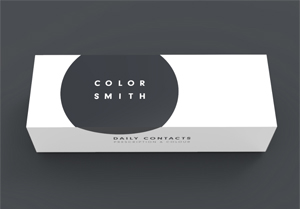A Dal Science alum is working with students in the Faculty of Engineering, as well as taking advantage of the new Emera ideaHUB incubator space, to help people with colour vision deficiencies see the full spectrum of the rainbow.
Twenty-eight-year-old Gabrielle Masone is developing a set of specialized contact lenses with light filtering technologies that will allow people to distinguish and perceive many of the colours associated with colour blindness disorders.
 Masone’s startup company, , will begin developing their prototype within Dalhousie’s Emera ideaHUB: an advanced incubator space designed to help product-focused early stage startups become scalable.
Masone’s startup company, , will begin developing their prototype within Dalhousie’s Emera ideaHUB: an advanced incubator space designed to help product-focused early stage startups become scalable.
“I can’t remember exactly when Dalhousie’s Emera ideaHUB got on my radar, but as soon as it did, I knew my business needed to be there,” says Masone. “This was such an amazing opportunity for our company.
“I went on a tour of the facility before it was complete, and I was stunned. The fact that it’s integrated into the Faculty of Engineering is incredibly beneficial to our company. We need to have specialized equipment that you can’t buy for less than a couple of million dollars, you have to build it, and that’s what we’re going to do here.”
Masone says a portion of the equipment required to advance her research is the first of its kind around the world, and so are her specialized contact lenses.
Building on an eye-opening experience Â
As a long-time activist for vision care, she recalls travelling to Washington D.C. as a young teenager to lobby US congressman for proper eye care examinations in public schools.
“Vision care has always been an ongoing theme in my life,” she says.
Born and raised in Detroit, Michigan, Masone became inspired to help others with vision deficiencies after having suffered from a condition that left her blind in one eye.
“When I was growing up I had something called Amblyopia, and if it’s not treated quickly you start to lose vision in one of your eyes. Mine wasn’t caught early enough,” she says. “It was a pretty nasty experience, so I thought if there was something I could do to help other people with vision problems, then that’s what I want to do.”
After completing her Bachelor of Science from Dal, Masone utilized her background in chemistry to begin the development on a set of contact lenses that could potentially change the lives of millions of people around the world. In 2017, she launched her company, Colorsmith Labs Inc.
Although not a life-threatening condition, colour blindness or colour vision deficiencies are inherited conditions that can affect one in every 12 men and one in every 200 women. Those who suffer from the condition often have difficulty distinguishing between colours such as red and green or blue and yellow.
“A lot of people don’t even know that they have a colour vision deficiency. They don’t find out until someone else points out that two certain colours are not the same,” says Masone. “It can be extremely challenging for those who have it and it can cause daily problems such as matching your own clothes, distinguishing between traffic lights or even qualifying for certain jobs.”
Masone says there are only a few solutions available to those who suffer from colour vision problems, including wearing a pair of bulky tinted Enchroma glasses.
“There are also a few other companies who are doing contact lenses, but they are using completely different technologies from what we are doing,” she explains.
“Our lenses incorporate a light filtering technology that allows light to pass through the contact lens. The lens will allow you to distinguish between colours and see certain colours you didn’t know existed before, such as pink. That’s a big one. You may have seen this as a gradient between light beige and dark beige before.”
Masone is now working with scientists at Saint Mary’s University to enhance and finish the prototype lens materials that will soon be tested on humans.
Collaborating with the Faculty of Engineering
She’s also working with two student groups from Dal’s Faculty of Engineering Capstone Program to design and create two separate technologies she will further develop within the Emera IdeaHUB.
All students within the Faculty of Engineering are required to complete a Capstone project in their final year of study. The Capstone Program matches student teams with partners from industry to solve real-world problems.
“The Chemical Engineering team is building a first in the world flow process piece of equipment,” Masone says. “I gave them some research papers and told them that I wasn’t sure if it was possible to build, but they did it.”
“The Mechanical Engineering students are building a piece of equipment which will allow you to make contact lenses on the spot. I’ve only ever seen one research paper referencing a small-scale contact lens manufacturing press like this one and it looked like something out of horror movie. After I gave them the project, the Capstone team provided me with the plans for something that was clean and sleek and beautiful. I was so impressed.”
Both capstone teams will be presenting their designs at the şÚÁĎłÔąĎÍřEngineering Capstone Conference on April 5 at the Westin Nova Scotian.
Masone plans to bring both student groups together this summer inside the Emera ideaHUB to further develop their technologies and integrate their equipment as one. She says she feels extremely grateful for the opportunity to access the resources, expertise, and top-of-the line gear that is now available.
“We know that our product can help millions of people around the world, but to do that we need the support we can get right here in Halifax. The Emera ideaHUB gives us that support.”

